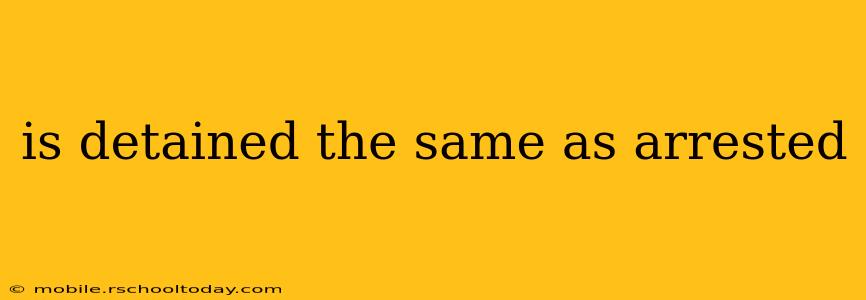Is Detained the Same as Arrested? Understanding the Key Differences
The terms "detained" and "arrested" are often used interchangeably, leading to confusion. While both involve a restriction of freedom, there are crucial legal distinctions between being detained and being arrested. This article will clarify the differences, addressing common questions and misconceptions.
What is Detention?
Detention is the temporary holding of a person by law enforcement. It's a less formal process than arrest and typically involves a shorter duration. Detention can occur in various circumstances, such as:
- For questioning: Police might detain someone for questioning if they are a witness or a person of interest in a crime. This detention is usually brief and doesn't necessarily mean the person is suspected of committing a crime.
- For identification purposes: Police may detain someone to verify their identity, particularly if there's a suspicion of involvement in a crime or if the individual is acting suspiciously.
- During investigations: Detention may occur during investigations to allow time to gather evidence or determine the next course of action.
- Immigration matters: Immigration authorities can detain individuals for immigration violations. This detention can last much longer than other types of detention.
Key characteristics of detention:
- Shorter duration: Detention is usually for a limited time, often hours, and sometimes even less.
- Less formal process: Detention doesn't always require a formal charge or booking.
- Usually no formal charges: Individuals are typically not charged with a crime during detention.
- Right to leave: Typically, an individual is free to leave after questioning or if their identity is confirmed.
What is Arrest?
Arrest is a more formal legal process involving the taking of a person into custody on suspicion of a crime. It signifies the official start of a criminal investigation leading towards potential prosecution.
Key characteristics of arrest:
- Formal process: An arrest requires legal grounds and is accompanied by paperwork.
- Formal charges: The person is generally charged with a specific crime.
- Booking: The arrest involves being brought to a police station, photographed, fingerprinted, and possibly held in custody.
- Loss of freedom: A person under arrest has significantly limited freedom of movement.
- Longer duration: An arrest may lead to prolonged detention, bail, or imprisonment pending trial.
What are the Legal Rights During Detention and Arrest?
Both detention and arrest come with legal rights. These rights vary depending on jurisdiction, but generally include:
- Right to remain silent: You do not have to answer questions from law enforcement.
- Right to an attorney: You have the right to consult with a lawyer.
- Right to due process: You are entitled to fair treatment under the law.
However, the extent of these rights may differ depending on whether you are detained or arrested. An arrest generally carries more significant legal consequences and affords more robust legal protections.
Can Detention Lead to Arrest?
Yes, absolutely. Detention can be a preliminary step that leads to an arrest. If, during detention, police gather sufficient evidence to believe a crime has been committed, they can then formally arrest the individual.
What if I am Detained Unlawfully?
Unlawful detention is a serious violation of your rights. If you feel you have been detained without justification or beyond a reasonable timeframe, you should seek legal counsel immediately.
Conclusion:
While both detention and arrest involve the limitation of a person's freedom, arrest is a more formal and serious legal process indicating suspicion of a specific crime. Detention is usually a temporary holding for questioning or identification. Understanding the nuances of these terms is crucial to protecting your rights. If you have concerns about a legal situation, consulting with a qualified attorney is always recommended.
